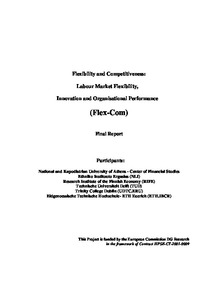Flexibility and competitiveness: labour market flexibility, innovation and organisational performance (Flex-Com)
"The aim of the project was to investigate the implications of the rapidly increasing labour market flexibility in Europe, which is the result of mainstream theory and its policy implications. It is suggested that there are potential adverse effects, which may occur in the longer term or may ar...
| Main Author: | |
|---|---|
| Institution: | ETUI-European Trade Union Institute |
| Format: | TEXT |
| Language: | English |
| Published: |
Athens
2003
National and Kapodistrian University of Athens. Center of Financial Studies |
| Subjects: | |
| Online Access: | https://www.labourline.org/KENTIKA-19293804124910110869-Flexibility-and-competitivenes.htm |
| Summary: | "The aim of the project was to investigate the implications of the rapidly increasing labour market flexibility in Europe, which is the result of mainstream theory and its policy implications. It is suggested that there are potential adverse effects, which may occur in the longer term or may arise from idiosyncrasies in specific environments. Not all economies are similarly receptive to all types of flexibility and thus generalised benchmarks may be an oversimplification. The research focuses on small open economies, using the examples of Ireland, Finland, the Netherlands, Switzerland and Greece. The main topic of this investigation is the relationship between flexibilisation, the European Social Model and long term competitiveness. It is argued that if, instead of studying direct linkages, one takes into consideration the effects to/from each of them to innovation the resulting effect becomes more complex and needs further investigation.
In order to meet its objective the research begins by focussing into a more detailed debate on what is flexibility and how it is perceived in different environments, in order to contribute to the academic debate on the lack of a universally agreed definition of flexibility and its various forms. The conclusion is that flexibility is far too complex to be covered by one name only. The appropriate policy mix, the discretionary power of the various actors and the potential of effective intervention differ greatly from one form of flexibility to another. Hence a more sophisticated jargon and debate are needed before policies are adopted. The informal sector makes it even more difficult to anticipate impacts.
This project offers econometric evidence that (without denying traditional views that under certain circumstances numerical flexibility contributes to the decrease of unemployment) numerical and wage flexibility in the medium to long term may lead to deteriorating economic performance and a reduced capacity to innovate. In addition, it was evident from the research that legal enforcement alone is insufficient for making markets more flexible. If social acceptance and trade offs for labour are not in place, the new legislation will not succeed in changing social routines. Even worse, if the introduction of formal rules triggers social resistance, it may even be counterproductive.
The fundamental changes in world production and trade suggest that the new economy requires more sophisticated models than those we have already experienced. Industrial relations are likely to be radically modified in the future. The lesson learned from the small countries is that there is a need for a refined approach in the enhancement of flexibility in Europe. Instead of looking for a generalised and standardised adoption of flexibility it is important to identify the key issues and challenges by type of country and adopt the measures that suit best each economic environment. European diversity calls upon a differentiated approach. This is best illustrated by the three out of the five small European countries studied, in which competitiveness and innovation were achieved with limited flexibility and consensus labour market policies. If this does not go against orthodoxy, at least it complements it, and thus raises doubt whether the mainstream view is the only viable option. There is no doubt that more flexibility is needed, but of what kind and for which circumstances it is more difficult to ascertain. Thus, new forms of flexibility, which would be a result of social experimentation, are needed. Unfortunately we identified a quasi absence of social experimentation in our case studies as elsewhere." |
|---|---|
| Physical Description: | 115 p. Digital |

